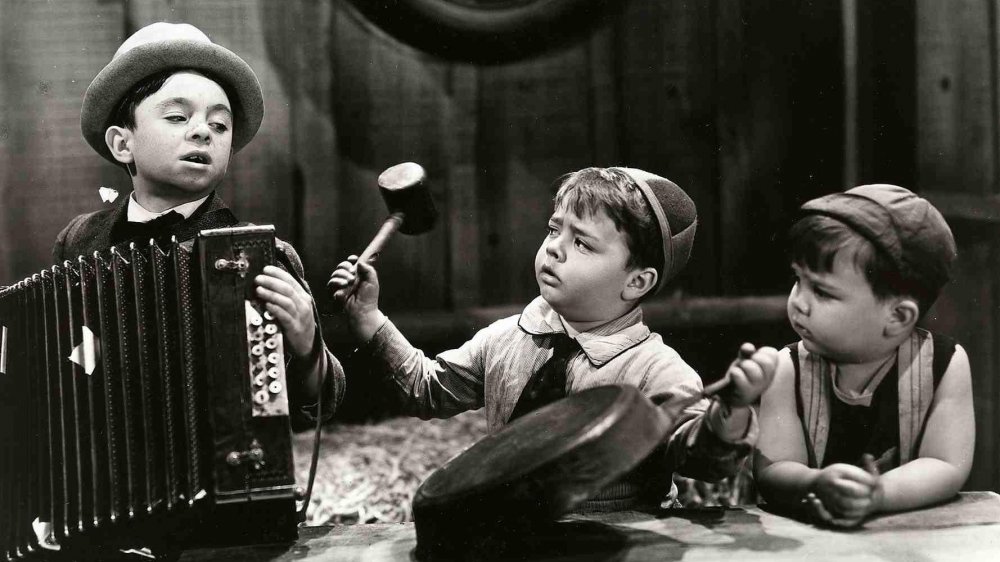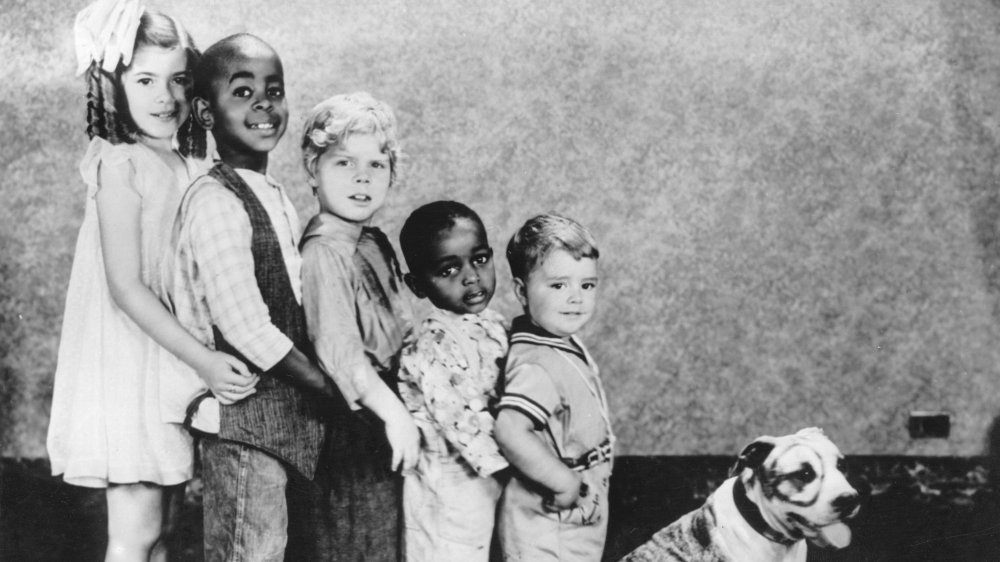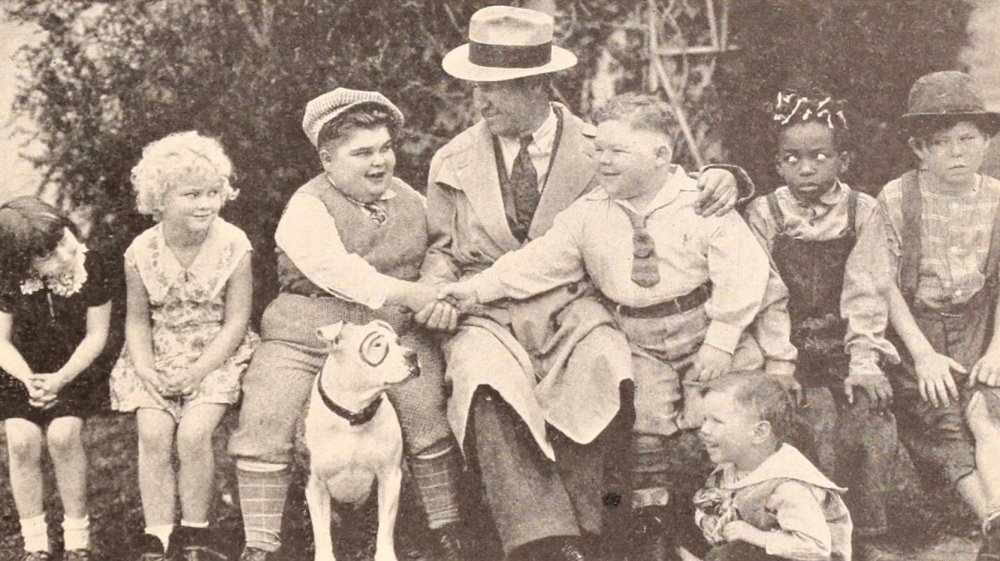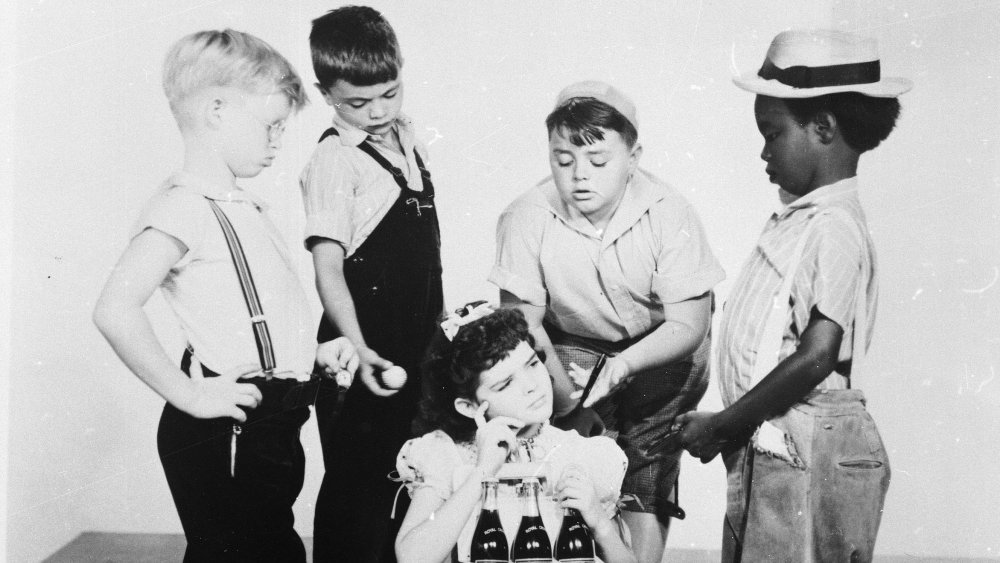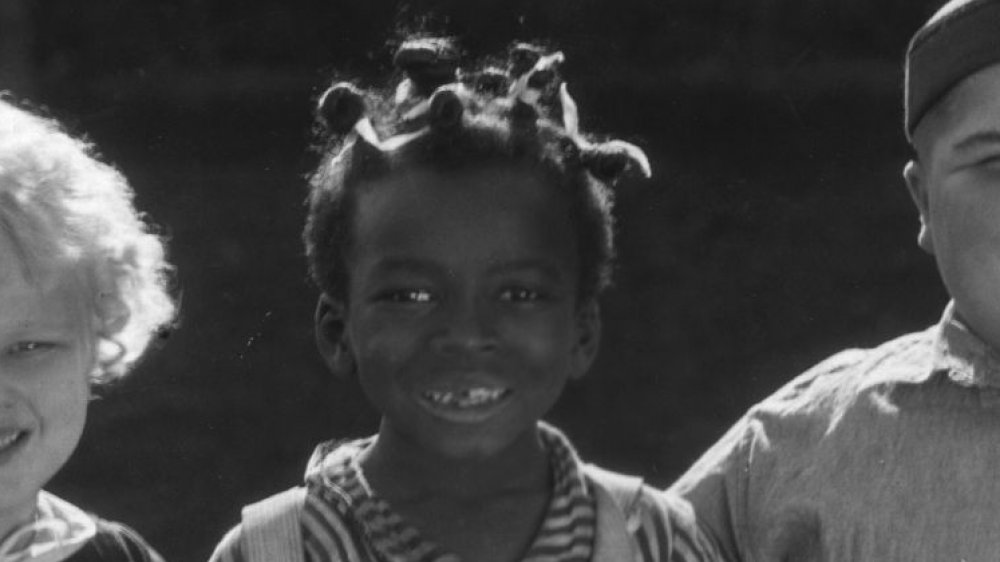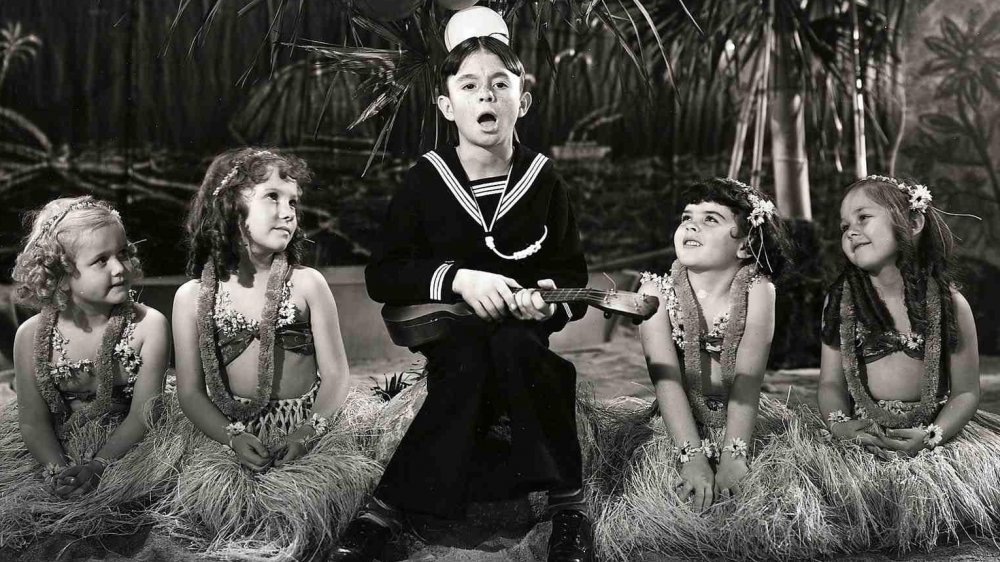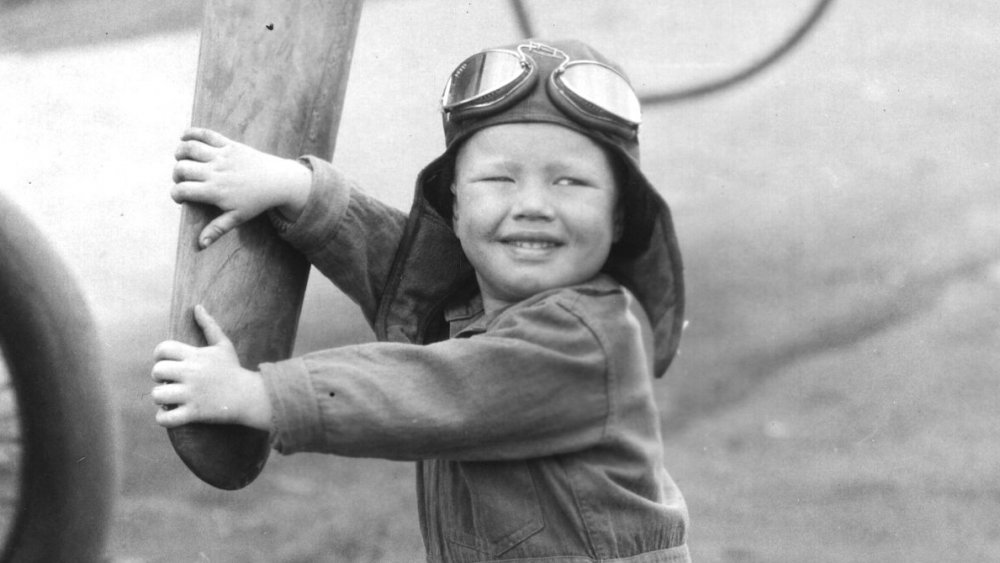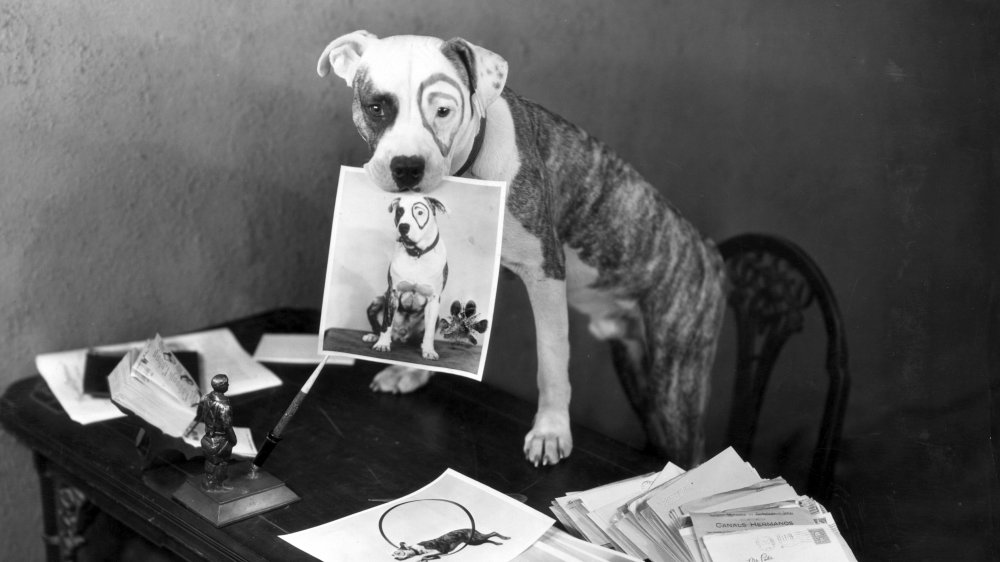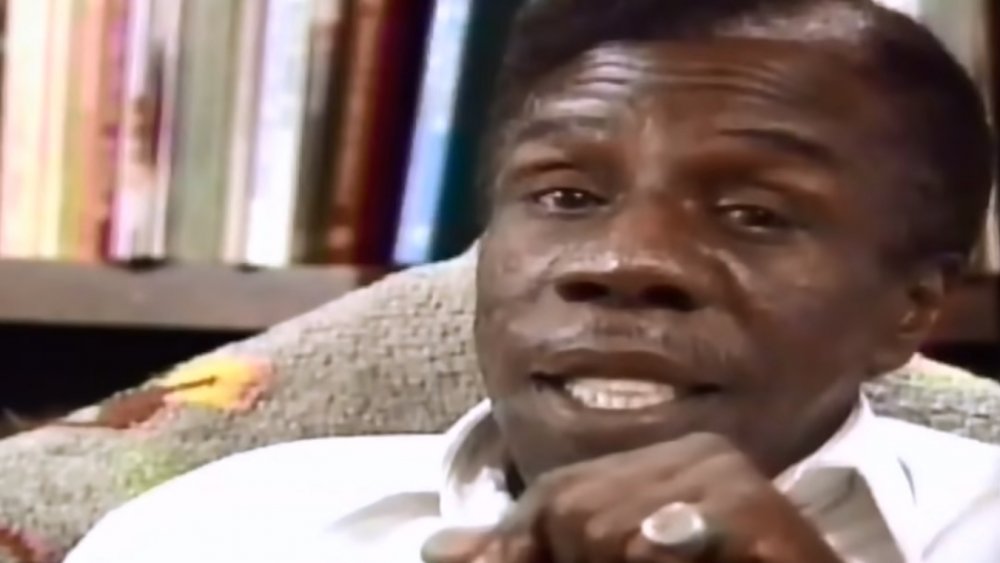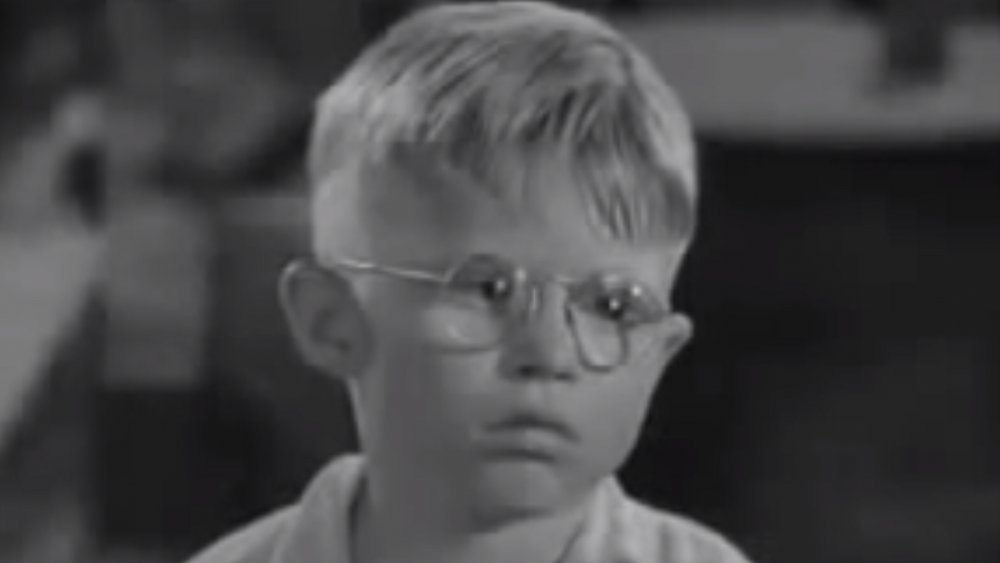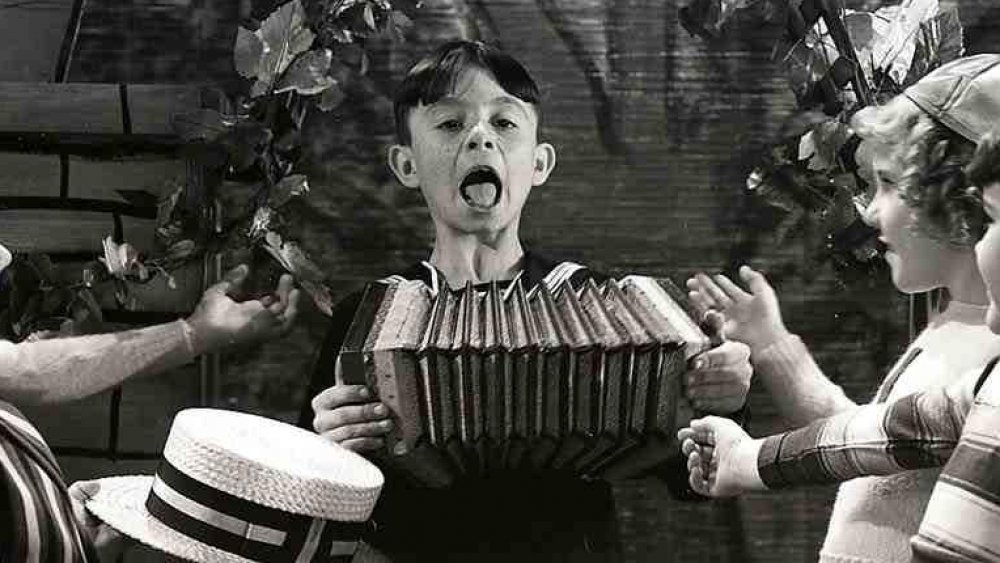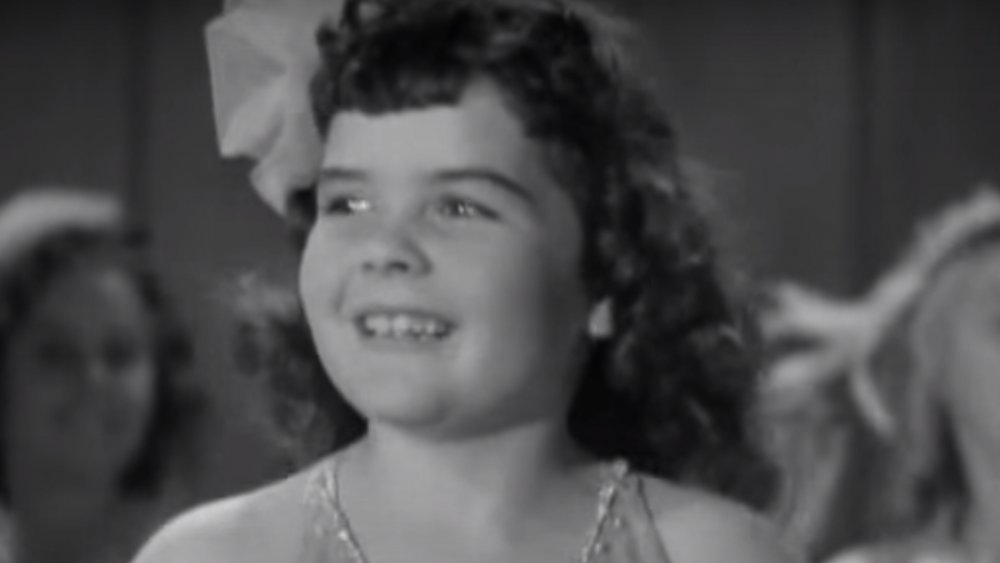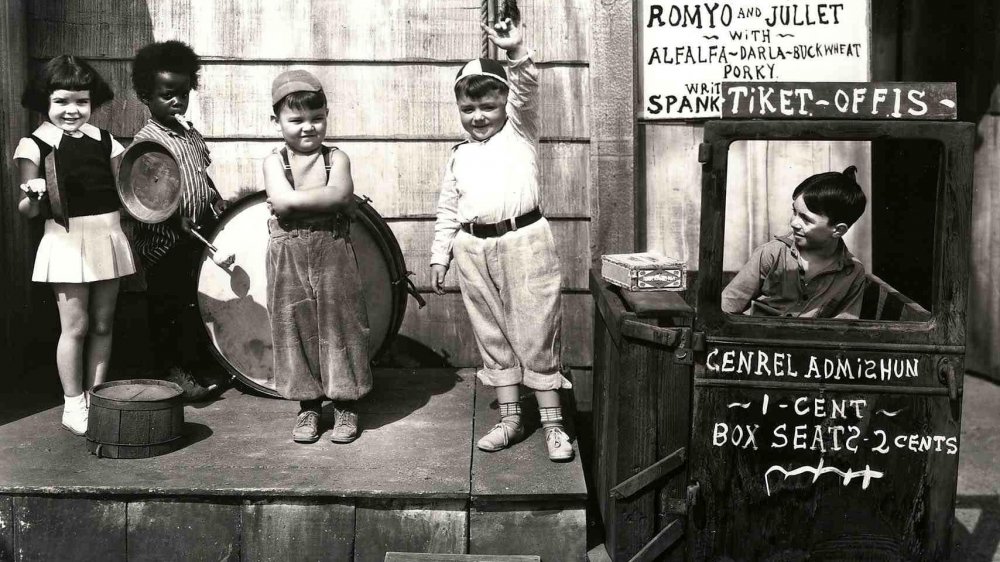Tragic Details About The Little Rascals
From 1922 to 1944, the Our Gang shorts delighted audiences with an idyllic and hilarious vision of childhood life. The brainchild of legendary comedy producer Hal Roach, the man behind Laurel and Hardy and Charley Chase, Our Gang featured a diverse cast of regular kids, with much of the comedy coming from their natural performances. Beginning in the silent era, Our Gang, originally called Hal Roach's Rascals, peaked with the advent of the talkies, making Spanky, Alfalfa, Buckwheat, and Darla household names.
In 1936, the gang got its own feature film. Released by MGM, the Civil War farce General Spanky was a flop. The shorts would limp along at MGM until 1944, when studio execs pulled the plug on the long-in-the-tooth tykes. However, this was far from the end of Our Gang. In 1954, the Our Gang shorts, repackaged as The Little Rascals, appeared on television for the first time, introducing a new generation of fans to the antics of America's favorite kiddie comedians. The Rascal revival was on, and it continues this day.
Yet, the story of Our Gang is no Hollywood fairy tale. For many of the formerly famous kids who brought a laugh-filled escape to Depression-era moviegoers, there was no happy ending. The specters of racism, drug abuse, and untimely death are just a few of the demons that haunted the young actors known as the Little Rascals. These are the tragic details of their troubled lives.
Racial tensions plagued The Little Rascals
In segregated 1920s and 1930s America, Our Gang was revolutionary in promoting an image of racial harmony. White children and Black children played and laughed together, free from the complicated adult world. In a 2015 interview with NPR, Julia Lee, author of Our Gang: A Racial History of the Little Rascals, says, "...this is the height of Jim Crow. You have the Ku Klux Klan undergoing a period of resurgence. You have lynchings going around across the country. And so race relations were at an incredible low, and yet you have this series that's so popular that shows Black and White children playing together as if there's no such thing as race at all."
Nevertheless, the idea of a racially mixed cast of children interacting as equals was anathema in much of the country, especially in the South. According to Lee, protests and angry letters decrying the prevalence of Black children in the films were common. One early short, 1922's "Lodge Night," was particularly problematic. That film finds the gang poking fun at the Ku Klux Klan – an unthinkable act in states where the racist organization still wielded political power.
Despite Hal Roach's seemingly egalitarian approach to casting, many of the Our Gang shorts are rife with racial stereotypes. Humor rooted in minstrelsy informs much of the comedy of The Little Rascals, and in 1971, the popular series faced a backlash spurred on by the civil rights movement. Ultimately, some of the more objectionable material was excised for television broadcast.
Stress led to a director's departure
Aside from producer Hal Roach, the man most responsible for making Our Gang a runaway success was senior director Robert F. McGowan. A former Denver firefighter, McGowan moved to California in 1913 with dreams of working in the burgeoning film industry. By 1922, the director was hard at work on the Our Gang comedies. Responsible for casting, McGowan, along with co-director Tom McNamara, assembled a troupe of stock characters that would serve as the formula for the series for the entirety of its run.
Our Gang was at its best under McGowan, who directed the series from 1922 to 1933. Although he had an affinity for kids and was a natural at coaxing hilarious, natural performances from his young cast, the job nonetheless took a toll on the director. According to Richard Lewis Ward's A History of the Hal Roach Studios, McGowan's deteriorating mental health led to the director taking a two-year sabbatical. Under the direction of McGowan's nephew, Anthony Mack, the comedies declined in quality. McGowan was soon back at the helm of Our Gang, but the advent of sound would present him with a new set of challenges.
Although the talkies forced McGowan to radically change his directing style, he adapted quickly and successfully. Still, the stress of corralling a cast of rambunctious child actors and dealing with overbearing stage parents finally proved too much for McGowan. Leaving the series in 1933, he returned for one last Our Gang short in 1936.
The Little Rascals' fame didn't bring them wealth
Although they were among the biggest stars of their day, the Little Rascals saw virtually none of the wealth they generated during their TV revival. With no contractual accommodations made for residual payments or image licensing in the pre-television 1930s, the Our Gang kids were financially shut out as adults. After aging out of the troupe, most of the Rascals failed to find lasting work in the entertainment industry. Only Jackie Cooper and Robert Blake found stardom as adults.
George "Spanky" McFarland worked tirelessly on behalf of himself and the cast to secure payment for the use of their images to, no avail. Despite his frustration, McFarland took a philosophical stance on the lack of residuals. "I have no regrets. Even though it was a job, we had a pretty good time making those comedies," he told the authors of the 1977 book Our Gang: The Life and Times of the Little Rascals. "As a kid I had most everything I wanted, and we had a good life. When it was over it was over."
Matthew "Stymie" Beard found that fulfillment as a former Rascal meant more than mere monetary gain. In a 1974 interview, Beard told The Tomorrow Show's Tom Snyder, "I'd like to have the money ... but, I get a joy out of seeing little kids come up to me and talk to me. ... I capitalize on it that way. I get a fulfillment in my heart. I get a fix everyday because someone says, 'There goes Stymie...'"
Farina, forgotten Rascal
Only one year old when cast by Hal Roach, Allen "Farina" Hoskins appeared in 105 Our Gang comedies between 1922 and 1931 – more than any other cast member. Literally growing up on film, Hoskins was, for a time, Our Gang's most popular actor. By the end of his tenure, he was earning $350 per week – much more than his castmates. Although he was not Our Gang's first Black child actor (that honor goes to Ernie "Sunshine Sammy" Morrison), he was, however, Hollywood's first Black child star. Clad in a baggy shift covered in patches with hair knotted in a cluster of pigtails, Farina's image was rooted in racist stereotypes.
Hoskins aged out of Our Gang at age 11, replaced by Mathew "Stymie" Beard. As Hoskins grew up, the press of the day was particularly cruel. Julia Lee, author of Our Gang: A Racial History of The Little Rascals, writes that the end of the child star's career was viewed as a "form of death." One newspaper callously wrote "[Hoskins is] no longer cute, so he can't scrabble a dime out of Hollywood."
Although his life as Farina was over, Allen Hoskins would find meaning outside of stardom. After seeing action in the Pacific during World War II, Hoskins became a licensed psychological technician noted for his work with the mentally disabled. In 1975, he was inducted into the Black Filmmakers Hall of Fame, according to America Comes Alive. On July 26, 1980, Allen Hoskins died of cancer at the age of 59.
Alfalfa the bully
Beloved for his off-key singing and ever-present cowlick, Carl "Alfalfa" Switzer remains a favorite of Little Rascals fans. While visiting relatives in California with their family, six year-old Carl and older brother Harold caught the eye of producer Hal Roach. After an impromptu performance of their musical act in the studio's commissary, the brothers joined the famed kiddie troupe. Charismatic Carl shined and was promoted to the main ensemble, while Harold faded into the background. Outshining lead George "Spanky" McFarland, Alfalfa quickly became the troupe's star.
However, when the cameras were off, Switzer was nothing like his affable alter ego. A bully with a penchant for practical jokes, he terrorized the young cast. In an interview with E!, director George Sydney recounted Switzer's behavior. "He would step on the other kids' feet. He would carry big nails in his pocket and stick it into the other kids and hit the kids and things like that." According to TV historian Kevin S. Butler, Switzer's stunts bordered on the sadistic. "Before they died, Spanky McFarland and Darla Hood told me of the cruel pranks that Alfalfa played on them," Butler states. "For instance, Alfie put sharp fish hooks in Spanky's back pants pockets and the poor guy had to have stitches. Alfie also placed an open switchblade knife in his pocket and tricked Darla into putting her hand into his pocket on the pretense that he had a ring for her from a Crackerjack box. She almost lost her fingers."
The sad mystery of Bobby Wheezer Hutchins
Despite being a featured Our Gang performer, little is known about Bobby "Wheezer" Hutchins. He was largely a mystery, even to his fellow Rascals. Only eight when he left the series, the nature of his departure has long been a topic of speculation among Our Gang fans. What is known is that Hutchins' parents were intent on his becoming a star, perhaps mistreating him in the process.
Often cast as little brother to Jackie Cooper, Hutchins was distant between takes. In an interview featured in the 1984 TV documentary Our Gang: Inside the Clubhouse, Cooper revealed how Hutchins' parents created a barrier between their son and the rest of the kids. "You would go to play with Wheezer and his father would pull him away. Very competitive," said Cooper. "[He] was to be left alone. I guess his father was going to make him a star [but] it never happened..."
Former Rascal Thomas "Buddy" MacDonald shared his memories of Bobby Hutchins with Laurel and Hardy.com's Richard W. Bann in 2001. "Wheezer was a special case," McDonald recalled. "There was a problem of some kind associated with Wheezer, maybe it was because of his parents. [...] Wheezer's dad was pushing McGowan and Hal Roach to feature Wheezer at the expense of the other kids, which they resisted."
On May 17, 1945, Army Air Corps cadet Bobby Hutchins died when his B-26 Marauder collided with another aircraft during his final training exercise. He was only 20 years old.
Pete the Pup was poisoned
Although the kids came and went, the one constant of Our Gang was their beloved four-legged pal, Petey. However, keen-eyed viewers will notice that there were actually several different dogs portraying the canine Rascal over the years. Handled by dog trainer Harry Lucenay, the first Pete the Pup was a black and white pit bull named Pal the Wonder Dog. A veteran of the silver screen, Pal previously played Tige in the Buster Brown comedies.
Pal's distinguishing feature, a marking resembling a partial circle around his right eye, was filled in with dye to make a continuous ring. A holdover from his Buster Brown days, the distinctive ring would make Pal one of the most recognized animal actors of his day. Not only was Pal famous, but he was rich. According to Pulitzer Prize-winning journalist John Woestendiek, Pal's contract with Hal Roach made him Our Gang's second highest paid actor.
Sadly, Pal's days as Petey were numbered. An unknown assailant, likely someone with a grudge against Lucenay, poisoned Pal in 1930. Naturally, the Rascals were crushed by the news. Pal was replaced by one of his offspring. Named Lucenay's Pete, the new Petey was a literal mirror image of Pal, necessitating the migration of the famous ring to the other eye. Lucenay's Pete played the role of Pete the Pup until 1932, when Harry Lucenay was fired. Thereafter, several dogs of different bloodlines portrayed the famous pooch.
Rascal imposters
In the decades since Our Gang ceased production, hundreds of imposters claiming to be former Rascals have attempted to dupe an unwitting public. One of the earliest was a man named Jack Bothwell, who claimed to have portrayed a nonexistent character named "Freckles." In the 1950s, Bothwell managed to scam his way onto the popular TV game show To Tell the Truth. According to TV writer Mark Evanier, the hoaxer continued his Rascals ruse for years, making personal appearances and doing the talk show circuit until his death in 1967. Bothwell's passing did nothing to abate his lies, as major news outlets eulogized the "former child star."
The most famous (and oddest) Our Gang imposter was Bill English (pictured above). Per The New York Times, in 1990, English, an amiable and well-liked grocery bagger from Arizona, convinced the producers of the ABC news program 20/20 that he was the original Buckwheat. The faux Buckwheat was outed by none other than George "Spanky" McFarland, who informed ABC that Billie Thomas, the only actor to ever portray the beloved Rascal, had passed away in 1980. McFarland confronted a virtually incoherent English on the tabloid news show A Current Affair, but the hoaxer refused to back away from his claims. 20/20 later apologized for the segment, which resulted in the ouster of a producer and legal action from the Thomas estate.
Billy Froggy Laughlin died at 16
Billy Laughlin was a late addition to Our Gang. Nicknamed "Froggy" for his comically guttural and raspy voice, he joined the troupe in 1940 for 29 of the MGM shorts. Laughlin, with his blond bowl cut and "Coke bottle" glasses, provided the late-era Rascals shorts with some of their few truly funny moments. Where stalwarts Spanky and Alfalfa struggled to bring the laughs as they neared obviously uncomfortable adolescence, Froggy simply had to open his mouth for instant comedic gold.
According to Our Gang: The Life and Times of the Little Rascals, Laughlin made his final appearance with Our Gang in what would be the troupe's last short, 1944's "Dancing Romeo." With his stint with the Rascals over, Laughlin made an appearance in the 1944 Simone Simon romantic comedy Johnny Doesn't Live Here Anymore. Uncredited in the role, Laughlin uses his natural voice for the first and only time on film.
Following Johnny Doesn't Live Here Anymore, 12-year-old Laughlin left show business permanently. In August 1948, Laughlin was killed when the motorized scooter he was riding with a friend collided with an oncoming truck. He was only 16 years old.
Carl Alfalfa Switzer's tragic life and violent end
After leaving Our Gang at 13, Carl "Alfalfa" Switzer struggled to recapture the success and fame the Hal Roach comedies had brought him. At first, Switzer's show business career seemed bright, but it peaked in 1942 with a part in the comedy There's One Born Every Minute. Only bit parts and low-budget serials followed.
Switzer made his final film appearance in The Defiant Ones, directed by Stanley Kramer. However, by this time, Switzer was earning his living far from the glitz and glamour of Hollywood. Working as a bartender, a fishing and big game hunting guide, and a dog breeder, Switzer's former fame was little more than a bitter memory. By the end of the decade, his luck was running out. In 1958, an unidentified gunman shot Switzer in the arm. A motive for the shooting was never determined. What is certain is that Switzer's notoriously volatile temper had earned him no friends.
On January 21, 1959, an enraged and intoxicated Switzer and a friend drove to the Mission Hills, California, home of Moses "Bud" Stiltz, per History. Determined to collect a $50 debt over a lost hunting dog, Switzer assaulted Stiltz, who fled to his bedroom, returning moments later with a .38-caliber revolver. Switzer allegedly drew a knife, and Stiltz shot him. The former Our Gang star died of massive internal bleeding at the age of 31. The incident was ruled a justifiable homicide.
A routine medical procedure killed Darla Hood
Darla Jean Hood was Our Gang's undisputed sweetheart. With her apple cheeks and angelic voice, she kept Alfalfa and the gang at constant odds as they vied for her attention.
Hood continued to work in entertainment after her time in Our Gang was over. In the 1940s, she formed a vocal group that performed background music for many popular Hollywood productions. Later, Hood made occasional guest appearances on TV, wrote songs, had a successful nightclub act, and worked as a voice-over artist.
Active in the Our Gang fan community, Hood was in the process of organizing a Little Rascals reunion when she fell ill with appendicitis. Following a routine appendectomy, Hood died suddenly of congestive heart failure on June 13, 1979, at the age of 47. An autopsy determined that a tainted blood transfusion had infected her with acute hepatitis, which caused her death.
A Little Rascals Curse?
Wheezer, Alfalfa, Darla, and Froggy were not the only Rascals to die tragic, early deaths. Norman "Chubby" Chaney passed at 21 after an operation to correct a glandular defect. Scotty Beckett descended into drug abuse and died under mysterious circumstances after suffering a brutal beating. Mickey Daniels became a chronic alcoholic and died homeless. With such a large proportion of former Our Gang actors dying young, rumors continue to swirl about an alleged "curse." Surviving cast member Robert Blake (credited as Mickey Gubitosi in the Our Gang shorts) became the latest "victim" when he was accused of involvement in the 2001 murder of his wife Bonnie Lee Bakely.
Although the untimely deaths of so many of the Little Rascals is indeed tragic, there's no evidence that the cast is somehow cursed. Statistically, the numbers just don't point to anything anomalous. As the debunkers at Snopes point out, given the number of cast members, the Little Rascals have had, on average, exceptionally long life spans.
